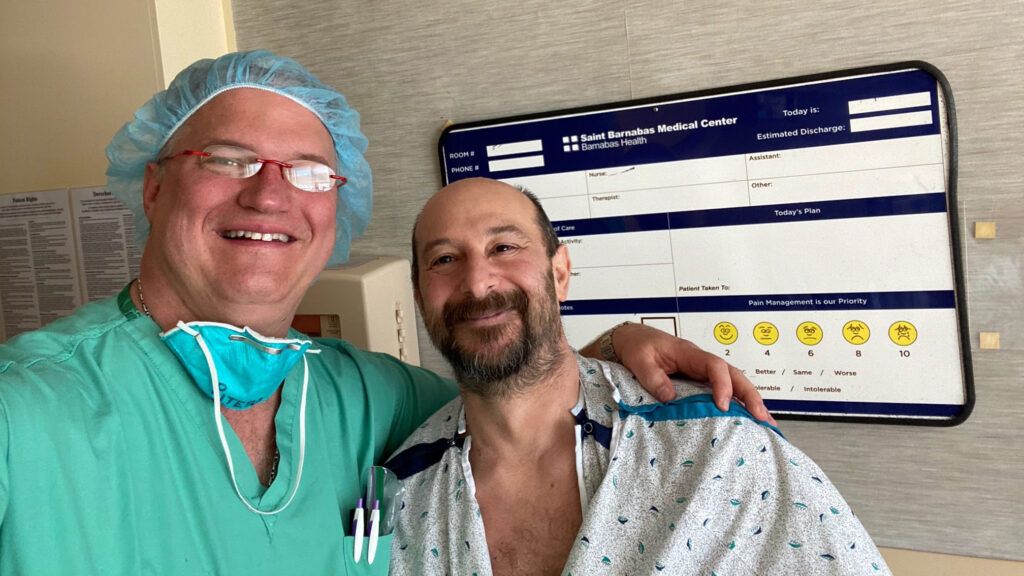It was all Dan Radice could do to lift his arm to signal the doctor. Never had he felt so weak. The breathing tube, inserted deep in his throat, seemed gigantic. Every minute felt like it could be his last.
Around him, in a makeshift ICU at New Jersey’s St. Barnabas Hospital, were 15 other patients battling the Covid-19 virus. Finally, Radice got the doctor’s attention. Could he have a pen and paper? Slowly, Radice scribbled:
“Am I going to die tonight?”
The words cut through Dr. Rick Pitera like a knife. The thing was, he owed his life to Radice, a cardiac exercise specialist at St. Barnabas. It was a debt Pitera thought he’d never be able to repay. Now their roles were reversed. It was late March 2020. Patients were dying every day at the hospital, with more than 400 coronavirus admissions, the second busiest hospital in the state. Just the day before, Pitera had watched a 50-year-old patient take her last breath. But he had to give Radice something to cling to. Hope. One more essential that seemed in short supply at St. Barnabas.
Pitera took his patient’s limp, nearly lifeless hand, and squeezed it. “You’re not going to die on my watch,” he said. “Not if I can help it.”
Nearly six years earlier, in the summer of 2014, Pitera had suffered a massive heart attack. Tests showed a clot inches from his heart by the time he reached the hospital. It seemed out of the blue. But looking back the warning signs had been building for years.
Pitera had been an anesthesiologist at St. Barnabas for 20 years. He was driven. Your classic Type-A personality with high blood pressure and a penchant for worrying.
When his heart gave out it shook him to the core. “At 47 I wasn’t sure what life I had left for me,” he recalled. He’d never thought about his own mortality. Now he couldn’t get it out of his mind.
A few weeks after surgery he began cardiac rehab. That’s where he met Dan Radice, a veteran exercise specialist in the department. Radice knew it was as important for his patients to regain their self-confidence as it was their strength. For one hour, three days a week, he patiently took Pitera through the six different exercise machines. They talked about mindfulness, about diet. The two men bonded over sports, a shared love for restaurants and trash talking.
By the end of three months of rehab, Pitera was a changed man. “Dan gave me my life back,” he says.
But Radice was just as impressed by Pitera’s progress and commitment. Six years later, when he found himself a patient at St. Barnabas, infected with Covid-19, he couldn’t believe he was looking up into the eyes of the man whose confidence he’d restored. In this time when doctors couldn’t help but be on edge, Pitera, once beset with worry, says he has been able to handle the stress far better than he would have before his heart attack.
“Not on my watch.” For Radice those words were exactly what he needed to hear. Slowly, day by day, the symptoms began to recede. He was taken off the ventilator. Moved to a floor for recovering patients, and given a private room. Radice began his own exercise program, small movements that he gradually increased in difficulty.
Pitera visited as often as he could to cheer on Radice’s progress. Nearly 20 days after he was admitted, Radice was discharged. Pitera came to his room to say goodbye. “You saved my life,” Radice told him. “You saved my life,” Pitera answered back. Hospital employees lined the hallways, applauding, as Radice was wheeled to his wife waiting outside.
“We have a lot of tough days ahead of us,” Pitera says. “Danny boosted a lot of people’s spirits just when we needed it.”
Radice continues to recuperate at home. He hopes to go back to work in mid-June. Every morning he takes a walk, stopping at the church in his neighborhood to pray.
“God put Rick Pitera in my life,” he says. “I’m certain of that.”






